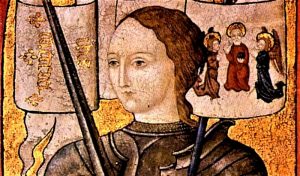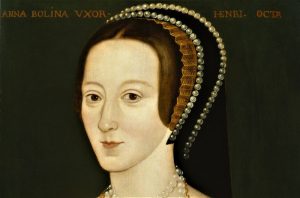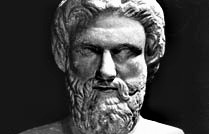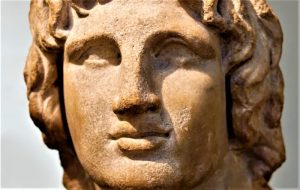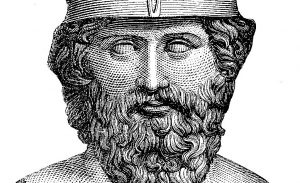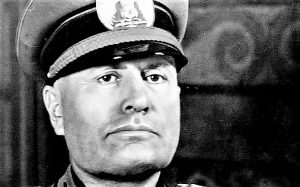Charlemagne
Charlemagne, also known as Charles the Great. He was king of the Franks, and Christian emperor of the West. He did many things to define the form and character of medieval Europe and presided over the Carolingian Renaissance.
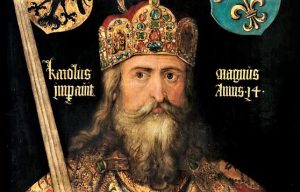
Personal information
- Born: 02/04/742
- Birthplace: Herstal, Belgium
- When he died: 28/01/814
- Where did he die: Aachen, Germany
Who was Charlemagne?
He was one of the Germanic monarchs who succeeded in establishing the Empire in Western Europe. Considered the "father of Europe", he was also king of the Franks and founder of the Carolingian Empire.
What Charlemagne did
There were many great feats of Charlemagne, the most important were:
- He unified Europe.
- He managed to process Christianity.
- He returned the Glory to Rome.
- He managed to make the first European unification in the 9th and 20th centuries.
- He imposed an expansive policy through an alliance of the Franks with the Papacy.
- He conquered Saxony (northern Germany), and a large number of territories that today are France, Switzerland, Austria, Belgium, Holland and Luxembourg, and most of Germany, Italy, Hungary, the Czech Republic, Slovakia and Croatia.
Historical context
Franks Christianization occurred in the 5th century with the conversion of the Merovingian king Clovis I. However, his dynasty had fallen after the battle of Tertry, producing that the powers of the government were exercised through the butlers. Pepin of Herstal, who was the butler of Austrasia, ended the conflict between the Frankish kings, becoming the ruler of the Frankish kingdom. When he died, he was succeeded by Charlemagne and Pepin the Brief who was Charlemagne’s father. When Charlemagne resigned, Charlemagne came to power.
Charlemagne’s biography
Charlemagne was born at the end of the 740s near Liège in what we know today as Belgium. He was the son of the Frankish king Pepin the Short. When the king died in 768, his kingdom was divided between his two sons and for three years Charlemagne ruled with his younger brother Carloman. When Charlemagne died suddenly in 771, Charlemagne became the only ruler.
He managed to dominate Europe in his time through rebellions and struggles and managed to expand the kingdom in an impressive way. On Christmas Day in the year 800, he was crowned by Pope Leo III and acclaimed as emperor of the Romans.
Death
After having had an important military career and expanding the territory, Charlemagne, in 813, called Ludovico Pio to name him king. After this ceremony, he became ill with pleuritis, an illness that left him in a coma and caused him to die on January 28, 814.
Fathers
His parents were King Pepin the Brief and Bertrada of Laon who was known by the name of Berta.
Relationships
He had five different wives. His first wife was called Himiltrudis, who gave him a son whom they called Pepin the Hunchback. His mother wanted to marry him to Desiderata, daughter of the king of Lombard’s, under political motives, however, refused to marry her. In the year 771 he met Hildgarda with whom he fell in love and with whom he married. After Hildegard died many years later, Charlemagne remarried the daughter of the Frankish Count, Fastrada, who caused him great problems. When she died, she had a relationship with Liutgarda, daughter of a German count, whom she married.
Children
His sons were male monarchs and were appointed by their father to occupy positions of great importance within the kingdom, in addition to being anointed by Para, his sons were:
- Carloman: it was his eldest son who took the Iron Crown and was appointed king by his father. He was known as Pepin when he was appointed king of Italy.
- Ludwig: he was appointed king of Aquitaine.
- Ludovico Pio who was appointed king before Charlemagne’s death.
On the other hand, Charlemagne’s daughters remained at home, as Charlemagne did not allow them to participate in activities within the government and did not want them to get married. His daughters were Adelaide, Rotrudis, Berta, Gisela and Hildegarde.
Charlemagne’s coronation
Charlemagne was crowned king of the Franks on the night of December 25, 800. He was crowned emperor of Rome by Pope Leo III in St. Peter’s Cathedral, thus becoming one of the most powerful sovereigns of his time. According to historians, Charlemagne was crowned unexpectedly, as he had knelt before the altar and the Pope had approached from behind placing the emperor’s crown.
Conquests
He conducted several military campaigns to expand his kingdom. He invaded Saxony in 772 and finally achieved his total conquest and conversion to Christianity. He also extended his rule to the south, conquering the Lombard kingdom in northern Italy. In 778, it invaded northern Spain, and was then controlled by the Moors. Between 780 and 800, Charlemagne added Bohemia to his empire and subdued the greedy in the middle basin of the Danube to form a buffer state for the eastern boundary of his empire.
How he ruled such a vast empire
Charlemagne managed to govern his entire empire through the union of himself through the cohesion of a large group of territories in the Christian West. Through this, he succeeded in getting the papacy to give the Carolingians the formation of the Pontifical States and the coronation. Being considered as the lord of the Church, he used the bishops as important pieces of his imperial organigram.
In addition, he carried out different wars and fought against the rebellions and resistances that presented themselves internally. He used a great variety of administrative, economic, governmental, judicial and religious assistants who together could do more daily tasks in his name. His generation managed to rule the Empire for several generations, and his important administrative system laid the foundations for several modern European nations.
Importance
Charlemagne was important both for the number of victories and for the size of his Empire, in addition to having included a combination of tradition and innovation. He campaigned against the Saxons, succeeded in imposing baptism and eliminated the rebels. He put his power to serve Christianity, monastic life, teaching of Latin and the rule of law. It was taken as a model for other kings, and represented the fusion of Germanic, Roman and Christian cultures, which would later become the basis of European civilization.
Contributions
Charlemagne managed to introduce administrative reforms on the lands under his control, establishing key representatives in each of the regions. He held a general assembly each year in his court in Aachen. He was able to standardize weights, measures and customs duties, helping to improve trade, and he also brought about important legal reforms. He sought to consolidate Christianity throughout his empire and convinced many scholars to come to his court and established a new library of Christian and classical works.
Physical appearance
There is no exact description of Charlemagne, however, some historians indicate that he was of wide and robust body, tall, had large eyes and white hair. He had a figure of authority and dignity. His belly was a little bulky, but he was proportionate anyway. With a firm, masculine step and a clear and powerful voice, he always dressed in a traditional, discreet and quite ordinary manner.
Personality
It is said that his personality was that of a jovial spirit. He infected others with his cheerful and positive spirit, full of strength, honest, not very arrogant and very calm, his personality was that of a modest and reserved man.
Phrases
Some of Charlemagne’s most recognized phrases were the following:
- I love those capable of smiling in the middle of problems.
- Men are easily persuaded that what they do not wish to be true is false, or at least doubtful.
- I have learned much more from my one defeat than from all my victories.
- Just as iron oxidizes for lack of use and standing water becomes rotten, so inactivity destroys the intellect.
- It is ignorance not to know how to distinguish between what needs demonstration and what does not need it.
Charlemagne in popular culture
As for the presence of Charlemagne within popular culture, books such as:
- Charlemagne by Harold Lamb
- Steve Berry’s Search for Charlemagne
- Charlemagne by Joaquín Javaloys
- Dirk Hussmann’s Charlemagne elephant
- Charlemagne and Medieval Europe by Cristina Durán
- Charlemagne by Wolfgang Braunfels
Films and documentaries have also been made that tell their story, for example:
- The Charlemagne Code (film)
- Charlemagne and the Carolingian Empire (documentary)
- Charlemagne’s Code: The Sacred Spear (film)
- Alexander the Great (film)
- The Age of Charlemagne (film)
How to cite this article?
Briceño V., Gabriela. (2019). Charlemagne. Recovered on 3 January, 2025, de Euston96: https://www.euston96.com/en/charlemagne/



